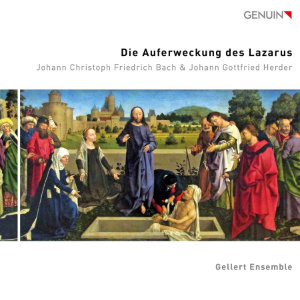
Johann Christoph Friedrich Bach (1732-1795)
Die Auferweckung des Lazarus (1773)
Martha – Anja Binkenstein (soprano)
Inga Jäger – Maria (alto)
Nora Rutte – Bystander (alto)
Robert Pohlers – Lazarus (tenor)
Richard Mauersberger – Bystander (tenor)
Diogo Mendes – Jesus (bass)
Gellert Ensemble/Andreas Mitschke
rec. live, 19-20 November 2021; Paul-Gerhardt-Kirche, Leipzig, Germany
German text and English translation
Genuin GEN22802 [58]
Johann Christoph Friedrich Bach is the least well-known and recorded of the four musical sons of Johann Sebastian, so this live recording of his 1773 Oratorio, The Resurrection of Lazarus, should excite some interest if only for that reason alone. But the composition is also of some cultural significance insofar as the text is by the prominent Enlightenment thinker Johann Gottfried Herder, who collaborated with Bach on several compositions whilst they both worked at the court of Wilhelm, Count of Schaumburg-Lippe-Bückeburg at Bückeburg. It represents a fascinating amalgam of the up-to-date galant style in the solo numbers and ensembles, with older forms of sacred choral music which he would have learnt from his father, in its Lutheran chorale harmonisations and the fugal choruses. Bach also seems to have had his father’s St. Matthew Passion in mind when accompanying Jesus’s words in the recitatives with a halo of string sonority.
This fine performance – in which the presence of an audience is undetectable until their applause at the end – sympathetically captures the work’s generally contemplative, devotional mood rather than any sustained dramatic narrative as such. The story tells of Jesus’s raising of Lazarus from the dead, which is related in just a few verses of St John’s Gospel, and so there is very little true narrative. At 58 minutes in length, and the form and Pietist mood of the work – if not entirely its musical style – it is more like a slightly extended type of cantata by Johann Sebastian than a true oratorio of either the Baroque or early Classical period retelling a dramatic Biblical episode, as it meditates upon an event from the Gospels which is only directly recounted within the work quite briefly.
Finely balanced strings create an atmosphere of composure and reflection, particularly when sounding more luminous like viols in the arioso and succeeding aria which open the piece. Warmly resonant cello and double bass sonorously ground the overall instrumental ensemble, and in forming the continuo with a soft chamber organ in the recitatives and ariosos, they give the music a gentle but palpable impetus. Two flutes join the graceful duet ‘Ach Brüder, wider mir gegeben’, lending it a pastoral air, whilst in the triumphal chorus shortly afterwards – hailing Lazarus’s raising – trenchant oboes stand in for what might otherwise have been trumpets, in a movement that has the ceremonial breadth of a comparable movement by Handel.
Mary’s grief and fear at the death of Lazarus at the outset of the work is aptly conveyed by Inga Jäger, while the boyish purity of Anja Binkenstein’s singing expresses Martha’s calmer character, trusting in the consolation that Jesus can bring. Diogo Mendes provides that voice of assurance when he appears as Jesus, asserting with confidence and some force his statement that Lazarus will rise again, as also his command to him that he come out of the tomb, making the central theological point of this Oratorio, which is also meant as a presaging of Jesus’ resurrection. Robert Pohlers sustains Lazarus’s long vocal lines well, but is somewhat reedy in sonority, as also is the concluding tenor aria by Richard Mauersberger.
The chorus remain transparent and lean in texture, even in the more extrovert numbers, for example with the neatly executed jaunty dotted rhythms of ‘Der Tod ist verschlungen in Sieg’. In the chorales they tend not to pause at the end of phrases, and so these movements are generally brisk, importing a certain, welcome degree of dramatic thrust. Overall this is a welcome release, providing a thoughtful account of a rare but attractive work, and an insight into how the sons of Bach steered the course of musical history from the high Baroque, to fully fledged Classicism.
Curtis Rogers
Help us financially by purchasing from





















